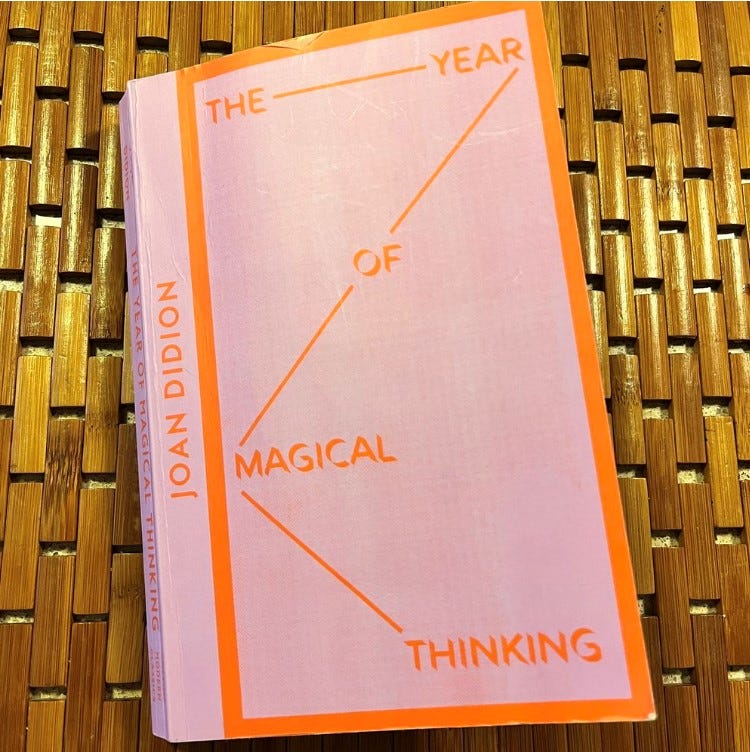THE YEAR OF MAGICAL THINKING by Joan Didion
My first venture into Didion’s writing, this memoir is one that one I won’t forget quickly.
My first venture into Didion’s writing, this memoir is one that one I won’t forget quickly.
The book is Didion’s writing of the first year after the death of her husband, John Gregory Dunne, an event that occurred five days after their daughter, Quintana, was put into a coma in the ICU with pneumonia and resulting sepsis. At dinner on 30 December 2003, Dunne had a fatal heart attack sitting down to their late evening meal, his death seemingly instant.
I have seen critiques of this book in that it is repetitive and somehow the narrative is disjointed. This is true. However, the experience of deep grief is one that is repetitive and disjointed in nature. It is a grief we feel often only once, maybe twice in life. It results from the death of a partner or, possibly a child. Losing a parent or sibling or friend is not the same thing - of this I know. Those griefs are deep and dark for sure, but they are different, too.
I experienced a grief that was deep as a young woman, upon the loss of a lover. I have, in the decades since, never been able to find the words to eloquently or adequately convey the feelings I had in the days, weeks and months after. I would say that it took more than two years for the pain to truly be something I could manage on a day to day basis.
I don’t intend to make a habit of directly quoting slabs of books I review, but the following is truly the most spectacular and authentic version of what I felt all those years ago:
Chapter 17
Grief turns out to be a place none of us know until we reach it. We anticipate (we know) that someone close to us could die, but we do not look beyond the few days or weeks that immediately follow such an imagined death. We misconstrue the nature of even those few days or weeks. We might expect if the death is sudden to feel shock. We do not expect this shock to be obliterative, dislocating to both body and mind. We might expect that we. Will be prostrate, inconsolable, crazy with loss. We do not expect to be literally crazy, cool customers who believe that their husband is about to return and need his shoes. In the version of grief we imagine, the model will be “healing.” A certain forward movement will prevail. The worst days will be the earliest days. We imagine that the moment to most severely test us will be the funeral, after which this hypothetical healing will take place. When we anticipate the funeral, we wonder about failing to “get through it,” rise to the occasion, exhibit the “strength” that invariably gets mentioned as the correct response to death. We anticipate needing to steel ourselves for the moment: will I be able to greet people, will I be able to leave the scene, will I be able even to get dressed that day? We have no way of knowing that this will not be the issue. We have no way of knowing that the funeral itself will be anodyne, a kind of narcotic regression in which we are wrapped in the care of others and the gravity and meaning of the occasion. Nor can we know ahead of the fact (and here lies the heart of the difference between grief as we imagine it and grief as it is) the unending absence that follows, the void, the very opposite of meaning, the relentless succession of moments during which we will confront the experience of meaninglessness itself.
- Joan Didion, The Year of Magical Thinking, 2005 (pp 188-189 of the Collins Modern Classic edition, 2021)
If for no other reason, this passage is why I loved this book. Yes, Didion goes over and again about the moments of Dunne’s death and the first year thereafter. But to understand the deep grief she felt is to understand that this is what grief is - a replaying of events, questions of what if? And her writing - beautiful as ever - reflected the space in which she inhabited for that year (and no doubt beyond) after her husband’s death. It was haunting, achingly real to me.
I truly commend this book to you, particularly if you have experienced a bereavement that you still seek to understand. Didion’s words will be hit you in the heart and comfort you, while causing you to feel deeply.



